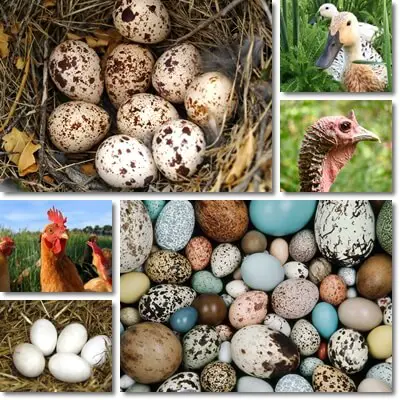Chicken, quail, duck, goose and turkey eggs are the most common egg varieties eaten around the world. And while one variety is preferred to all others in different regions, all five have become available essentially everywhere in the last years. Getting to choose from different types of eggs is great, but it also raises the question which egg variety is healthiest. Depending on which nutrients in particular you are looking to get from eating eggs and any dietary restrictions that result from existing medical conditions, one of these 5 different types of eggs is better for your health.
There are many aspects to consider when it comes to deciding which egg variety is the most nutritious and the healthiest for you. For example, if you have diabetes, your doctor has likely asked you to reduce your intake of fats. What this means is that duck and goose eggs are not the best choices for you because they have a high fat and cholesterol content. But if you have a pronounced vitamin B12 deficiency, then you would benefit more from eating duck and goose eggs than any other variety as both are the best sources of the vitamin of all five egg varieties.

The idea is you have to consider any existing health issues and the dietary and nutritional restrictions they come with. Based on this you can then compare the nutritional value of different egg varieties and choose which egg is best for you. Because the best eggs variety is the one that is the healthiest for you and only you. The second most important aspect to consider is how many eggs you should eat per week or a day. Some people may eat two eggs a day almost every day. Others may eat eggs occasionally or infrequently. There is really no correct answer when it comes to eggs per week recommendations. One thing nutrition experts do agree upon however is that excesses are never good for your health.
A general recommendation says it’s best not to eat more than 2-3 eggs a day and try to go several days without eating any every once in a while. If you need to lose weight and have medical issues caused by excess weight, than eggs should be an infrequent part of your diet and you should exclude other sources of fat, especially processed foods, before introducing eggs so as to maintain a balance.
Eating only the egg white is a good solution only if you are looking to get more quality protein and cut down on calories to lose weight. Know that egg whites are essentially devoid of vitamins, minerals and fats and cholesterol which are, after all, essential nutrients. It’s actually the yolk that holds most of the nutritional value of the egg. Below are the nutritional values of 5 different types of eggs: chicken, quail, duck, goose and turkey (see their health benefits on the egg page). By comparing protein, fats, carbohydrates, calories, vitamins and minerals you should be able to tell which of the 5 is the best choice for you.

Nutrition facts for 100 g of whole chicken egg, raw
Macronutrients:
– 143 kcal (kilocalories)
– 12.56 g of protein, with all essential amino acids
– 9.5 g of fat, with 373 mg of cholesterol
– 0.7 g of carbohydrates, including sugars 0.37 g
– 0 g fiber
Vitamins:Vitamin A: 160 mcg (micrograms)
Vitamin B1 (thiamine): 0.040 mg
Vitamin B2 (riboflavin): 0.457 mg
Vitamin B3 (niacin): 0.075 mg
Vitamin B5 (pantothenic acid): 1.4 mg
Vitamin B6 (pyridoxine): 0.170 mg
Vitamin B9 (folic acid): 47 mcg
Vitamin B12 (cobalamin): 0.89 mcg
Vitamin C: 0 mg
Vitamin D: 82 IU (2 mcg)
Vitamin E: 1.05 mcg
Vitamin K: 0.3 mg
Choline: 290 mg
Minerals:
Calcium: 56 mg
Iron: 1.75 mg
Magnesium: 12 mg
Phosphorus: 198 mg
Potassium: 138 mg
Sodium: 142 mg
Selenium: highly variable, diet determined
Zinc: 1.29 mg
Weight: 1 whole chicken egg has an average of 50 g
Nutrition facts for 100 g of whole quail egg, raw
Macronutrients:
– 158 kcal (kilocalories)
– 13.05 g of protein, with all essential amino acids
– 11.09 g of fat, with 844 mg of cholesterol
– 0.41 g of carbohydrates, including sugars 0.4 g
– 0 g of fiber
Vitamins:
Vitamin A: 156 mcg
Vitamin B1 (thiamine): 0.130 mg
Vitamin B2 (riboflavin): 0.790 mg
Vitamin B3 (niacin): 0.150 mg
Vitamin B5 (pantothenic acid): not determined
Vitamin B6 (pyridoxine): 0.150 mg
Vitamin B9 (folate): 66 mcg
Vitamin B12 (cobalamin): 1.58 mcg
Vitamin C: 0 mg
Vitamin D: 55 IU (1.4 mcg)
Vitamin E: 1.08 mcg
Vitamin K: 0.3 mg
Choline: 119 mg
Minerals:
Calcium: 64 mg
Iron: 3.65 mg
Magnesium: 13 mg
Phosphorus: 226 mg
Potassium: 132 mg
Sodium: 141 mg
Selenium: highly variable, diet-determined
Zinc: 1.47 mg
Weight: 1 whole quail egg has roughly 9 g.
10 whole quail eggs weigh 99 g.
Nutrition facts for 100 g of whole duck egg, raw
Macronutrients:
– 185 kcal (kilocalories)
– 12.8 g of protein, with all essential amino acids
– 13.77 g of fat, with 884 mg of cholesterol
– 1.45 g of carbohydrates, including sugars 0.93 g
– 0 g of fiber
Vitamins:
Vitamin A: 194 mcg
Vitamin B1 (thiamine): 0.156 mg
Vitamin B2 (riboflavin): 0.404 mg
Vitamin B3 (niacin): 0.200 mg
Vitamin B5 (pantothenic acid): not determined
Vitamin B6 (pyridoxine): 0.250 mg
Vitamin B9 (folate): 80 mcg
Vitamin B12 (cobalamin): 5.40 mcg
Vitamin C: 0 mg
Vitamin D: 69 IU (1.7 mcg)
Vitamin E: 1.34 mcg
Vitamin K: 0.4 mg
Choline: presumably high content of choline, but variable
Minerals:
Calcium: 64 mg
Iron: 3.85 mg
Magnesium: 17 mg
Phosphorus: 220 mg
Potassium: 222 mg
Sodium: 146 mg
Selenium: highly variable, diet-determined
Zinc: 1.41 mg
Weight: 1 whole duck egg weighs 70 g
Nutrition facts for 100 g of whole goose egg, raw
Macronutrients:
– 185 kcal (kilocalories)
– 13.87 g of protein, with all essential amino acids
– 13.27 g of fat, with 852 mg of cholesterol
– 1.35 g of carbohydrates, including sugars 0.94 g
– 0 g of fiber
Vitamins:
Vitamin A: 187 mcg
Vitamin B1 (thiamine): 0.147 mg
Vitamin B2 (riboflavin): 0.382 mg
Vitamin B3 (niacin): 0.189 mg
Vitamin B5 (pantothenic acid): not determined
Vitamin B6 (pyridoxine): 0.236 mg
Vitamin B9 (folate): 76 mcg
Vitamin B12 (cobalamin): 5.1 mcg
Vitamin C: 0 mg
Vitamin D: 66 IU (1.7 mcg)
Vitamin E: 1.29 mcg
Vitamin K: 0.4 mg
Choline: not determined, presumably high
Minerals:
Calcium: 60 mg
Iron: 3.64 mg
Magnesium: 16 mg
Phosphorus: 208 mg
Potassium: 210 mg
Sodium: 138 mg
Selenium: highly variable, diet-determined
Zinc: 1.33 mg
Weight: 1 whole goose egg has 144 g (medium-sized egg).
Nutrition facts for 100 g of whole turkey egg, raw
Macronutrients:
– 171 kcal (kilocalories)
– 13.68 g of protein, with all essential amino acids
– 11.88 g of fat, with 933 mg of cholesterol
– 1.15 g of carbohydrates
– 0 g of fiber
Vitamins:
Vitamin A: 166 mcg
Vitamin B1 (thiamine): 0.110 mg
Vitamin B2 (riboflavin): 0.470 mg
Vitamin B3 (niacin): 0.024 mg
Vitamin B5 (pantothenic acid): not determined
Vitamin B6 (pyridoxine): 0.131 mg
Vitamin B9 (folate): 71 mcg
Vitamin B12 (cobalamin): 1.69 mcg
Vitamin C: 0 mg
Vitamin D: not determined
Vitamin E: not determined
Vitamin K: not determined
Choline: not determined
Minerals:
Calcium: 99 mg
Iron: 4.1 mg
Magnesium: 13 mg
Phosphorus: 170 mg
Potassium: 142 mg
Sodium: 151 mg
Selenium: highly variable, diet-determined
Zinc: 1.58 mg
Weight: 1 whole turkey egg weighs 79 g.
This is considered a medium-sized egg.
The younger the hen, the smaller the egg.
The older the hen, the larger the egg.
Observations on nutritional profile
A few general observations about different types of eggs nutrition:
– Chicken eggs are the most balanced in terms of nutritional value with neither a too low a vitamin and minerals profile, nor a too high calories, fat and cholesterol content.
– Duck eggs are the best egg varieties in terms of vitamin B12 and vitamin B9 content.
– Goose eggs are the second best source of vitamins B12 and B9.
– Chicken eggs are lowest in cholesterol. Goose eggs are highest in cholesterol.
– Duck eggs are presumably richest in choline, as indicated by their high trimethylamine content which gives them a particular fish-like taste.
– All egg varieties have no fiber and no vitamin C.
– All varieties are important dietary sources of B vitamins.
– Out of all varieties, goose eggs have more protein, closely followed by turkey eggs.
– All varieties are satiating, nutritious for the brain and muscles, boost energy levels and are good for pregnant women.
– The shells are rich in calcium. The yolk contains almost all nutrients, fats and calories. The egg white is mostly protein.
– Quail eggs have more yolk than egg white compared to chicken and other varieties.
– Quail eggs are considered less allergenic than chicken and other varieties.
However, anyone with egg allergy should avoid all varieties.
So when you ask yourself which egg variety is the most nutritious, known that all of these five different types of eggs have a similar nutrient profile, with a few exceptions, and are all good for health. Provided, of course, they are eaten in moderation and preferably not every single day for your entire life. Any egg variety that provides the best nutrition for you is also the healthiest.
